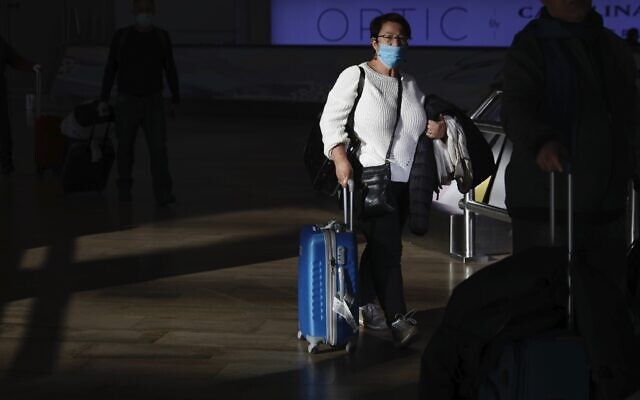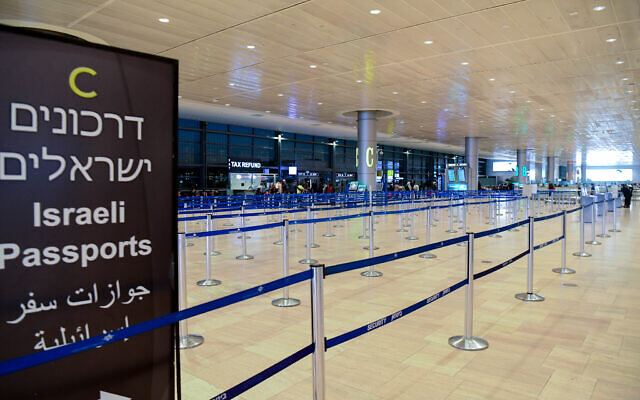7 of the new patients returned from European countries, 6 came into contact with sick individuals in Israel; medic among newly diagnosed, though cause of his infection is unknown

Fourteen Israelis were added Sunday evening to the list of those who have contracted the coronavirus, including the first in the country whose source of infection was unknown, bringing the total number of cases to 39.
Seven of the new patients returned from European countries, and six came into contact with sick individuals in Israel.
The Health Ministry initially released the details of three of the cases, saying it would publish information on the others shortly.
The first new case was a woman from the Haifa area who traveled to the Spanish island of Tenerife on February 25 and returned on March 3. She subsequently went into home quarantine, preventing others from contracting the disease, and the Health Ministry said she was in good condition. However, the ministry said anyone who was on her Iberia Airways flights from Tel Aviv to Tenerife, with a layover in Madrid, should immediately quarantine themselves for 14 days.
The second new case was a man from northern Israel who traveled to Vienna on February 29 and returned on March 5. He subsequently went into quarantine, but took the train to Acre on his way home. The ministry said anyone who was on the 6:05 p.m. train that evening from Ben Gurion Airport must be quarantined for 14 days.
Current regulations bar travelers returning from countries on the quarantine list from taking taxis or public transportation to get home from the airport, but no solutions have been offered to those who don’t have a family member or friend to pick them up.
Both Spain and Austria were among the countries from which returning travelers are required to quarantine themselves for two weeks.

The third new case was a 60-year-old man from Jerusalem who came in contact with a French national who had contracted COVID-19.
After coming in contact with the tourist, the man visited the Yona Koren Optics Store in Jerusalem where he apparently works, on March 3 and 4 from 9:30 a.m. to 2 p.m. and 5 p.m to 7:30 p.m. On March 5 from 8-9:30 p.m., he ate at the BIGA restaurant in the northern West Bank’s Ariel shopping center before going into home quarantine the next day. Anyone who visited those locations during those times was directed to enter quarantine for 14 days.
One of the new patients, a man in his 40s from central Israel, was also added to the list, though the Health Ministry said that it was not sure how he had contracted the virus. The Magen David Adom emergency service later said the infected man was a medic.
Earlier Sunday evening, Prime Minister Benjamin Netanyahu said at a press conference that if Israel decides to expand the list of countries from which returning travelers will be required to enter home quarantine for 14 days, the directive will cover the entire world, adding that a decision on the matter would be made in the coming hours.
Despite expectation that Netanyahu would announce a directive against passengers returning from the US, or at least particular states where the highest number of cases have been documented, the prime minister avoided doing so.
He added that additional meetings would be held with senior officials in Israel and around the world in the coming hours before a possible expansion of directives aimed at limiting the scope of the outbreak.
“This is not an easy decision. Health comes first. It secures the economy,” Netanyahu said.

Earlier in the day, the Israel Police and Health Ministry announced the establishment of a joint task force that will enforce quarantine orders placed against some 80,000 Israelis to prevent the spread of coronavirus.
Since the outbreak of the virus last month, nine cases have been opened against Israelis who knowingly violated the quarantine orders or attempted to disrupt Health Ministry inspectors in carrying out their duties, police said.
Health Ministry deputy director general Itamar Grotto on Sunday estimated that the number of Israeli COVID-19 cases could surge to tens of thousands.
Netanyahu declared on Saturday that the disease was a pandemic.
The virus hit a milestone Friday, infecting more than 100,000 people worldwide. It has killed nearly 3,400 people.
Israel has already required returning Israelis from several countries to self-quarantine, and barred foreigners from a slew of European and Asian countries. Some 80,000 Israelis are now reported to be in self-quarantine, and large events such as concerts and sporting matches have been canceled.
Israelis have also been advised against all non-vital international travel.
As reported by The Times of Israel
